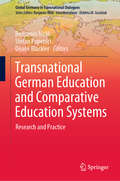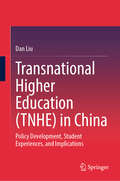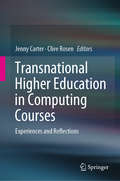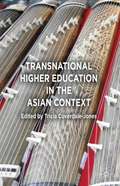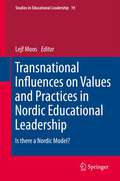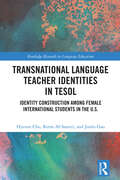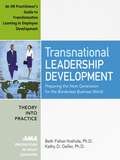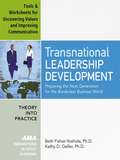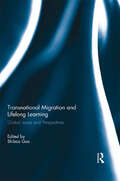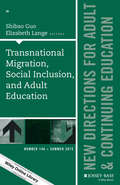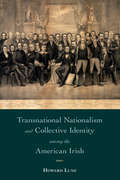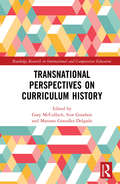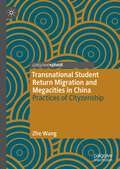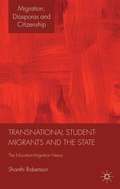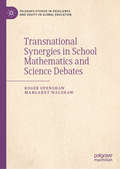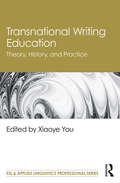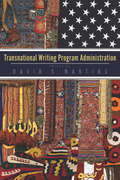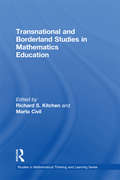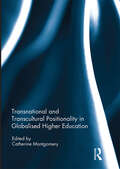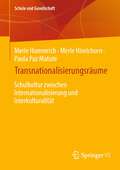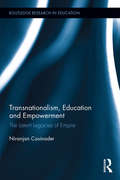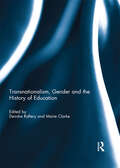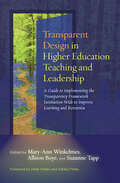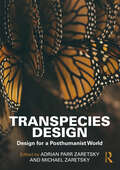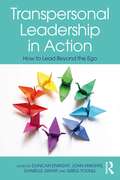- Table View
- List View
Transnational German Education and Comparative Education Systems: Research and Practice (Global Germany in Transnational Dialogues)
by Benjamin Nickl Stefan Popenici Deane BlacklerThis book presents an in-depth look at the state of transnational education and comparative perspectives on education systems between Germany and other nation states. It explores how a transnational education identity in secondary and tertiary institutions has developed in the German and other national contexts and which lessons can be learned from current challenges and successes of education systems. It uses detailed case studies to promote critical rethinking of current educational practices in high schools and universities, specifically of race, gender, religion and learner ability in educational settings. It understands learning and teaching as an arena to discuss transnational education opportunities in the 21st century as an emerging or evolving discourse on contemporary forms of transnationalism.
Transnational Higher Education (TNHE) in China: Policy Development, Student Experiences, and Implications
by Dan LiuThis book provides an in-depth analysis of the motivations, experiences, and challenges that Chinese students face in transnational higher education (TNHE). It traces their educational journey-from their initial motivations for seeking TNHE to their graduate employment-while exploring the academic, social, and cultural dimensions of their experiences. Readers will gain a nuanced understanding of Chinese students&’ engagement with TNHE, both within China and at later stages abroad. The book offers valuable insights for educators, policymakers, and researchers, providing a strong foundation for addressing the challenges and opportunities associated with TNHE in China. Additionally, it serves as a key resource for those interested in enhancing Chinese students&’ perceptions of and experiences in TNHE programmes. Beyond practical implications, this book contributes to the theorisation of TNHE, teacher development, and research methodologies in the field.
Transnational Higher Education in Computing Courses: Experiences and Reflections
by Jenny Carter Clive RosenThere has been exponential growth in transnational education (TNE) in the last few years as UK universities have looked to expand their markets. Recipient countries have sought short cuts to developing their higher education provision which has proved a lucrative income stream for some universities. But overseas collaborations are not without risk. Recipient countries can be concerned with external influence over curricula, quality being diluted and higher education being infected by neo-imperialism. These concerns are not without foundation. There are risks for providers too. Reputations can be damaged if academic standards are compromised. Conflicts of interest can occur between quality of provision and the pot of gold on offer. Staff can view overseas collaborations as distracting from their research and commitment to home students. Computing is a particularly popular subject for TNE, but critical thinking, analysis, independent learning, and creativity can be compromised. Preventing plagiarism is difficult. Constant changes in technology result in constant curricula revision which causes severe problems for overseas collaborations. This book focuses on TNE in the computing domain. However cross-cultural issues challenge TNE management and administration whatever the subject area. If the ever present tensions are not continuously monitored they can quickly threaten the sustainability of the collaboration. This book identifies many of the threats and some of the solutions. The readership for this book is truly global. Any international development officer in higher education considering an overseas collaboration will benefit from this book. Any academic becoming engaged in, or already involved with a TNE partnership, either as provider or recipient, will gain information and insight into the practice and issues. Researchers in TNE will discover more lines of enquiry. Students considering a course with an overseas provider or in coming to the UK to study will be better prepared thereby enabling a more fulfilling and rewarding experience. Anyone who has an interest in TNE, whether at the senior executive level, operational level, delivering programmes or as a recipient of TNE should read this book. The wealth of experience gathered here will provoke questions, prompt debate and offer solutions. It has been written by people who know the issues, bear the scars and are happy to share their knowledge. It will greatly benefit future transnational collaborations.
Transnational Higher Education in the Asian Context
by Tricia Coverdale-JonesThis book offers new insights and perspectives on internationalization and trans-national higher education (TNHE) with contributions from three continents. These include the student experience in Malaysia, China, Japan and India as well as institutional perspectives and pedagogical implications of new research.
Transnational Influences on Values and Practices in Nordic Educational Leadership
by Lejf MoosThis book explores to what extent transnational influences change national/local values and practices in the Nordic educational systems. It provides country cases and thematic chapters that give nuanced insights into the influence of transnational agencies on national governance and discourses. It describes how national discourses and regulation influences school leadership values, culture and practice, in competition with traditional values. The transnational and global discourse on educational leadership is mostly formed according to Anglo-American thinking and tradition. Pivotal foundations of this discourse are strong hierarchical societies/class societies with liberal democracies, and clearly streamed education systems. The Nordic discourse, however, builds on a more equal society and flat hierarchies with participatory democracy, and on comprehensive schooling with strong local community roots. Leadership thinking and practices are formed by the culture and context they are part of: they are primarily shaped by the national/local values, traditions and practices, and only partially shaped by politics, discourses and literature. Due to the fact that a great deal of the literature that is being used in the Nordic contexts is of Anglo-American origin and many of the research projects have Anglo-American foundations, it is difficult to distinguish the sources for leadership thinking and practice. This book distinguishes the Nordic from the Anglo-American thinking and presents important findings and arguments for leadership practitioners inside as well as outside the Nordic countries.
Transnational Language Teacher Identities in TESOL: Identity Construction Among Female International Students in the U.S. (Routledge Research in Language Education)
by Hyesun Cho Reem Al-Samiri Junfu GaoDrawing on Bakhtin’s notion of ideological becoming and the concepts of intersectionality and transnationalism, this volume offers a unique conceptual framework to explore and better understand the identity construction and negotiation of international TESOL students. Focusing on female graduate students studying in the U.S., the text utilizes rich narratives to illustrate how nuanced language teacher identities develop through complex dialogic processes relating to language, race, and gender—as well as migration experiences—and individuals’ integration in academic and professional communities. Ultimately, the text contests deficit reductionist views of transnational students that are implied by educational policies and administration. This text will benefit scholars, academics, and students in the fields of bilingualism, TESOL, multicultural education, and language identity more broadly. Those involved with teaching and teacher education, as well as language and culture in general, will also benefit from this book.
Transnational Leadership Development: An HR Practioner's Guide to Transformative Learning in Employee Development - Appendix 2
by Beth Fisher-Yoshida Kathy D. GellerTransnational Leadership Development acquaints readers with the paradoxes and mental processes leaders need to relate successfully to people with different backgrounds, cultures, and societal identities. This appendix helps translate the transformative learning process into a process that HR professionals can use in employee interventions and learning experiences. It explains six dynamics necessary to provide a context for an intervention plus examples of how to apply it to conflict management.
Transnational Leadership Development: Tools and Worksheets for Uncovering Values and Improving Communication - Appendix 1
by Beth Fisher-Yoshida Kathy D. GellerTransnational Leadership Development acquaints readers with the paradoxes and mental processes leaders need to relate successfully to people with different backgrounds, cultures, and societal identities. This appendix includes tools to facilitate communication including a social identity map, values charts, reflection worksheets, strategy planning tools, a dialog model, guided questions and tips.
Transnational Migration and Lifelong Learning: Global Issues And Perspectives
by Shibao GuoEconomic globalization, modern transportation, and advanced communication technologies have greatly enhanced the mobility of people across national boundaries. The resulting demographic, social, and cultural changes create new opportunities for development as well as new challenges for lifelong learning. Transnational Migration and Lifelong Learning examines the changing nature of lifelong learning in the current age of transnational migration. The book brings together international scholars from a range of countries in a dialogue about the relationship between work, learning, mobility, knowledge, and citizenship in the context of globalization and migration. It covers a wide range of topics, including: global perspectives and analyses of migration; the impact of migration on lifelong learning; processes of exclusion and inclusion in lifelong learning; the tension between mobility, knowledge, and recognition; and transnationalism, learning communities, and citizenship. This book was originally published as a special issue of the International Journal of Lifelong Education.
Transnational Migration, Social Inclusion, and Adult Education: New Directions for Adult and Continuing Education, Number 146 (J-B ACE Single Issue Adult & Continuing Education)
by Shibao Guo Elizabeth LangeAs a result of transnational migration, many countries are becoming increasingly ethnoculturally diverse, creating both new opportunities and challenges for practices of adult education. This volume examines the changing nature of adult education in the age of increased transnational migration and: • synthesize the latest research, policies, and practices in transnational migration and adult education, • examines the larger historical and structural issues of race and gender in immigration and newer theories, such as diaspora studies, in relation to adult education, and • provides examples and recommendations for enhancing socially just and inclusive adult education environments for newcomers. Transborder injustices and multiple dimensions of social justice permeate immigration dynamics and challenge adult educators to rethink social justice in a transnational age.This is the 146th volume of the Jossey Bass series New Directions for Adult and Continuing Education. Noted for its depth of coverage, it explores issues of common interest to instructors, administrators, counselors, and policymakers in a broad range of education settings, such as colleges and universities, extension programs, businesses, libraries, and museums.
Transnational Nationalism and Collective Identity among the American Irish
by Howard LuneIn Transnational Nationalism and Collective Identity among the American Irish, Howard Lune considers the development and mobilization of different nationalisms over 125 years of Irish diasporic history (1791–1920) and how these campaigns defined the Irish nation and Irish citizenship. Lune takes a collective approach to exploring identity, concentrating on social identities in which organizations are the primary creative agent to understand who we are and how we come to define ourselves. As exiled Irishmen moved to the United States, they sought to create a new Irish republic following the American model. Lune traces the construction of Irish American identity through the establishment and development of Irish nationalist organizations in the United States. He looks at how networks—such as societies, clubs, and private organizations—can influence and foster diaspora, nationalism, and nationalist movements. By separating nationalism from the physical nation, Transnational Nationalism and Collective Identity among the American Irish uniquely captures the processes and mechanisms by which collective identities are constructed, negotiated, and disseminated. Inevitably, this work tackles the question of what it means to be Irish—to have a nationality, a community, or a shared history.
Transnational Perspectives on Curriculum History (Routledge Research in International and Comparative Education)
by Ivor Goodson Gary McCulloch Mariano González-DelgadoThis book offers a remarkable range of research that emphasises the need to analyse the shaping of curricula under historical, social and political variables. Teachers’ life stories, the Cold War as a contextual element that framed curricular transformations in the US and Europe, and the study of trends in education policy at transnational level are issues addressed throughout. The book presents new lines of work, offering multidisciplinary perspectives and provides an overview of how to move forwards. The book brings together the work of international specialists on Curriculum History and presents research that offers new perspectives and methodologies from which to approach the study of the History of Education and Educational Policy. It offers new debates which rethink the historical study of the curriculum and offers a strong interdisciplinary approach, with contributions across Education, History and the Social Sciences. This book will be of great interest for academics and researchers in the fields of education and curriculum studies. It will also appeal to educational professionals, teachers and policy makers.
Transnational Student Return Migration and Megacities in China: Practices of Cityzenship
by Zhe WangThis book is a study of the return migration of overseas Chinese students. By 2018, over 3.5 million Chinese students had returned from overseas universities to China, with the megacities of Beijing, Shanghai, and Shenzhen representing by far their main destinations. In other words, when overseas students return to China, many do not return to their hometown but usually land, work and settle down in Beijing, Shanghai and Shenzhen. Their return migration is thus not only transnational, but also internal-urban. This book adopts a multi-level geographical analysis to explore this important phenomenon, exploring why and how returnees choose these three cities and how they experience and interpret their everyday lives in these megacities after their return. In doing so, it highlights the importance of cultural logics and multiscalar thinking of transnational Chinese students’ return migration and illuminates how their transnational migration reproduces domestic socio-spatial inequalities. This book brings an important contribution to the fields of Cultural Geography, Urban Geography, Transnationalism, Migration Studies and Citizenship Studies.
Transnational Student-Migrants and the State
by Shanthi RobertsonInternational students are often engaged not just in education, but in high stakes towards gaining permanent migration status. This book unpacks the consequences of this education-migration nexus, analyzing migration policies and providing a vivid picture of student-migrants' lived experiences.
Transnational Synergies in School Mathematics and Science Debates (Palgrave Studies in Excellence and Equity in Global Education)
by Margaret Walshaw Roger OpenshawThis book highlights and interrogates the continued interest and scrutiny of mathematics and science education. National debates on excellence and equity tend to focus largely on underachievement in mathematics and science rather than subjects in the arts or music: this is due to a belief that these curriculum areas are central to individual workplace success and national development in a competitive economic environment. The authors explore the history of these assumptions, as well as the debates based around claims that student achievement levels in these subjects has fallen. Spanning the United States, New Zealand, Australia and the United Kingdom, the chapters question how such debates are sustained and amplified: how has this perceived ‘crisis’ been articulated and spread across national borders? This comprehensive book will be of interest and value to scholars of mathematics and science education, as well as international education debates.
Transnational Writing Education: Theory, History, and Practice (ESL & Applied Linguistics Professional Series)
by Xiaoye YouArguing that writing teachers need to enable students to recognize, negotiate with, deconstruct, and transcend national, racial, ethnic, and linguistic boundaries, this volume proposes a "transnational" framework as an alternative approach to literacy education and as a vital component to cultivating students as global citizens. In a field of evolving literacy practices, this volume builds off the three pillars of transnational writing education—translingualism, transculturalism, and cosmopolitanism—and offers both conceptual and practice-based support for scholars, students, and educators in order to address current issues of inclusion, multilingual learning, and diversity.
Transnational Writing Program Administration (G - Reference, Information And Interdisciplinary Subjects Ser.)
by David S. MartinsWhile local conditions remain at the forefront of writing program administration, transnational activities are slowly and thoroughly shifting the questions we ask about writing curricula, the space and place in which writing happens, and the cultural and linguistic issues at the heart of the relationships forged in literacy work. Transnational Writing Program Administration challenges taken-for-granted assumptions regarding program identity, curriculum and pedagogical effectiveness, logistics and quality assurance, faculty and student demographics, innovative partnerships and research, and the infrastructure needed to support writing instruction in higher education. Well-known scholars and new voices in the field extend the theoretical underpinnings of writing program administration to consider programs, activities, and institutions involving students and faculty from two or more countries working together and highlight the situated practices of such efforts. The collection brings translingual graduate students at the forefront of writing studies together with established administrators, teachers, and researchers and intends to enrich the efforts of WPAs by examining the practices and theories that impact our ability to conceive of writing program administration as transnational. This collection will enable writing program administrators to take the emerging locations of writing instruction seriously, to address the role of language difference in writing, and to engage critically with the key notions and approaches to writing program administration that reveal its transnationality.
Transnational and Borderland Studies in Mathematics Education (Studies in Mathematical Thinking and Learning Series)
by Richard S. Kitchen Marta CivilEvery year, significant numbers of immigrant children from Mexico enter classrooms in the United States. These immigrants comprise a heterogeneous group of students with diverse needs, abilities, and experiences. Transnational and Borderland Studies in Mathematics Education is the first collection to offer research studies across these communities. Providing invaluable research on both sending and receiving communities in Mexico and the US, this collection considers the multiple aspects of children’s experiences with mathematics, including curriculum, classroom participation structures, mathematical reasoning and discourse – both in and out of school – and parents’ perceptions and beliefs about mathematics instruction. An important treatment of an insufficiently documented subject, this collection brings together researchers on both sides of the border to foster and support an interest in documenting evidence that will set the stage for future studies in mathematics education.
Transnational and Transcultural Positionality in Globalised Higher Education
by Catherine MontgomeryTransnational higher education (TNHE), where students study on a ‘foreign’ degree programme whilst remaining in their home country, has seen exponential development over the last decade. In addition to the increase in students engaged in TNHE across the globe, the involvement of university teachers in TNHE has also risen in response to the demand for this form of international education. Although research into transnational education has doubled since 2006, there is a paucity of research focusing on transnational teacher education, especially outside of North America. The global nature and scope of the expansion of TNHE remains underexplored, and the ways in which different countries are realising TNHE provision is little understood. This book explores the experiences and perceptions of teachers in transnational higher education, interrogating the ways in which university teachers negotiate cultural, linguistic, and disciplinary contexts in order to provide transformative learning experiences for their students. This book was originally published as a special issue of the Journal of Education for Teaching.
Transnationalisierungsräume: Schulkultur zwischen Internationalisierung und Interkulturalität (Schule und Gesellschaft #65)
by Merle Hummrich Merle Hinrichsen Paula Paz MatuteDas Buch zeigt die pädagogische Bedeutung von Globalisierungsprozessen in der Institution Schule. Diese lässt sich anhand von zwei Dimensionen markieren: der Internationalisierung von Schule und der Relevanz von ethnischer Diversität. Wie sich Schulkulturen auf diese Prozesse beziehen und wie sie damit einhergehende Anforderungen bearbeiten, wird theoretisch mit dem Konzept der Transnationalisierung aufgeschlüsselt. Zudem wird herausgearbeitet welche Möglichkeitsräume für Bildungsteilhabe sich in diesem Zusammenhang für Jugendliche eröffnen.
Transnationalism, Education and Empowerment: The Latent Legacies of Empire (Routledge Research in Education)
by Niranjan CasinaderTransnationalism, Education and Empowerment challenges the prevailing notion that transnationalism is concerned fundamentally with the process of enhanced global population movement that has been allied with modern globalisation. Instead, it argues that transnationalism is a state of mind, disassociated from the notion of ‘place,’ that can be observed equally in societies of the past. Drawing on the context of colonial Sri Lanka and the British Empire, the book discusses how education in the British Empire was the means by which some marginalised groups in colonised societies were able to activate their transnational dispositions. Far from being a universal oppressor of colonised people, as argued by postcolonial scholarship, colonial education was capable of creating pathways to life improvement that did not exist before the European colonial period, providing agency to those who did not possess it prior to colonial rule. The book begins by exploring the meaning of transnationalism, arguing that it needs to be redefined to meet the realities of past and current global societies. It then moves on to examine the ways education was used within the period of 18th and 19th century European colonialism, with a particular emphasis on Sri Lanka and other parts of the former British Empire. Drawing from examples of his own family’s ancestry, Casinader then discusses how some marginalised groups in parts of the British Empire were able to use education as the key to unlocking their pre-existing transnational dispositions in order to create pathways for more prosperous futures. Rather than being subjugated by colonial education, they harnessed the educational aspects of British colonial education for their own goals. This book is one of the first to contest and critically evaluate the contemporary conceptualisation of transnationalism, particularly in the educational context. It will be of key interest to academics, researchers and postgraduate students in the fields of education, the history of education, imperial and colonial history, cultural studies and geography.
Transnationalism, Gender and the History of Education
by Deirdre Raftery and Marie ClarkeIn the past decade, historians have begun to make use of the optic of ‘transnationalism’, a perspective used traditionally by social anthropologists and sociologists in their study of the movement and flow of ideas between continents and countries. Historical scholarship has adopted this tool, and in this book historians of education use it to add nuance and depth to research on gender and education, and particularly to the education experiences of women and girls. The book brings together a group of internationally-regarded scholars, who are doing important research on transnationalism and the social construction of gender, with particular reference to education environments such as schools and colleges. The book is therefore very much at the cutting-edge of theoretical and methodological advances in the history of education.This book was originally published as a special issue of the History of Education.
Transparent Design in Higher Education Teaching and Leadership: A Guide to Implementing the Transparency Framework Institution-Wide to Improve Learning and Retention (Higher Education Ser.)
by Peter Felten Mary-Ann Winkelmes Ashley Finley Allison Boye Suzanne TappThis book offers a comprehensive guide to the Transparency in Learning and Teaching (TILT) framework that has convincingly demonstrated that implementation increases retention and improved outcomes for all students. Its premise is simple: to make learning processes explicit and equitably accessible for all students. Transparent instruction involves faculty/student discussion about several important aspects of academic work before students undertake that work, making explicit the purpose of the work, the knowledge that will be gained and its utility in students’ lives beyond college; explaining the tasks involved, the expected criteria, and providing multiple examples of real-world work applications of the specific academic discipline. The simple change of making objective and methods explicit – that faculty recognize as consistent with their teaching goals – creates substantial benefits for students and demonstrably increases such predictors of college students’ success as academic confidence, sense of belonging in college, self-awareness of skill development, and persistence. This guide presents a brief history of TILT, summarizes both past and current research on its impact on learning, and describes the three-part Transparency Framework (of purposes, tasks and criteria). The three sections of the book in turn demonstrate why and how transparent instruction works suggesting strategies for instructors who wish to adopt it; describing how educational developers and teaching centers have adopted the Framework; and concluding with examples of how several institutions have used the Framework to connect the daily work of faculty with the learning goals that departments, programs and institutions aim to demonstrate.
Transpecies Design: Design for a Posthumanist World
by Michael Zaretsky Adrian Parr ZaretskyIn May 2019, the United Nations released the Global Assessment Report on Biodiversity and Ecosystem Services which warned that human activities will drive nearly one million species to extinction in a few decades. The primary reasons for this are habitat loss and biodiversity demise caused by changing climate, pollution, introducing nonindigenous species, clearing land, over population, and consumption. Given this situation, humans must change course as both human wellbeing and the wellbeing of other-than-human species are imbricated in one another. One way humanity can accomplish the needed transformation is to move beyond an anthropocentric view of life by embracing a transpecies approach that is premised upon interconnected flourishing.Transpecies design, as outlined in this book, offers a new approach to regenerating the natural environment while honoring biodiversity. Rather than presenting the human experience as the goal of design, transpecies design takes the inextricable linkages connecting living things as both its starting point and end goal. As such, it moves beyond human experience serving as the fundamental ingredient for making better design processes and decisions.This book is essential reading for artists, designers, and architects, as well as students of architecture, landscape architecture, interior architecture, art, product design, urban design, planning, environmental philosophy, and cultural studies.
Transpersonal Leadership in Action: How to Lead Beyond the Ego
by Duncan EnrightHow can leaders promote diversity, equality and inclusion? What does it mean to let go of leadership? How do learning, feedback and coaching help us become better leaders? Following the success of Leading Beyond the Ego, this book shows how to apply transpersonal leadership – practiced leaders who are radical, ethical, authentic and act beyond their own interests to create high-performing organisations – in a wide range of contexts. It considers the attributes of transpersonal leaders and how they transform organisations by building strong, collaborative relationships and a caring, sustainable and performance-enhancing environment. Shining a light on the way forward for senior leaders and HR and talent professionals, the book covers: Characteristics of transpersonal leaders such as purpose, ethics and adult development Impact of transpersonal leaders on global organisations, during digital transformation and change and through crises Case studies of transpersonal leadership in different contexts including in India and East Asia, when leading remotely, in HR and politics Transpersonal Leadership in Action is essential reading for senior leaders, HR professionals and those responsible for leader and organisational development.
